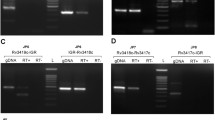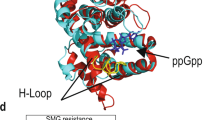Abstract
RelMtb, a GTP pyrophosphokinase encoded by the Mycobacterium tuberculosis (Mtb) genome, catalyzes synthesis of (p)ppGpp from ATP and GDP(GTP) and its hydrolysis to GDP(GTP) and pyrophosphate to mediate stringent response, which helps bacteria to survive during nutrient limitation. Like other members of Rel_Spo homologs, RelMtb has four distinct domains: HD, Rel_Spo (RSD), TGS and ACT. The N-terminal HD and RSD are responsible for (p)ppGpp hydrolysis and synthesis, respectively. In this study, we have dissected the rel Mtb gene function and determined the minimal region essential for (p)ppGpp synthetic activity. The RelMtb and its truncated derivatives were expressed from an arabinose inducible promoter (P BAD ), and in vivo functional analyses were done in a (p)ppGpp null Escherichia coli strain. Our results indicate that only 243 amino acids (188–430 residues) containing fragment are sufficient for RelMtb (p)ppGpp synthetic activity. The results were further confirmed by in vitro assays using purified proteins. We further characterized the RSD of RelMtb by substituting several conserved amino acids with structurally related residues and identified six such residues, which appeared to be critical for maintaining its catalytic activity. Furthermore, we have also extended our analysis to an RSD encoding gene rv1366 of Mtb, and experimental results indicated that the encoded protein Rv1366 is unable to synthesize (p)ppGpp.




Similar content being viewed by others
References
Amato SM, Orman MA, Brynildsen MP (2013) Metabolic control of persister formation in Escherichia coli. Mol Cell 50:475–487
Aravind L, Koonin EV (1998) The HD domain defines a new superfamily of metal-dependent phosphohydrolases. Trends Biochem Sci 23:469–472
Atkinson GC, Tenson T, Hauryliuk V (2011) The RelA/SpoT homolog (RSH) superfamily: distribution and functional evolution of ppGpp synthetases and hydrolases across the tree of life. PLoS ONE 6:e23479
Ausubel FM, Brent R, Kingston RE, Moore DD, Seidman JG, Smith JA, Struhl K (1989) Current protocols in molecular biology. In: Struhl K (ed) Wiley, New York
Avarbock A, Avarbock D, Teh JS, Buckstein M, Wang ZM, Rubin H (2005) Functional regulation of the opposing (p)ppGpp synthetase/hydrolase activities of RelMtb from Mycobacterium tuberculosis. Biochemistry 44:9913–9923
Cashel M, Gentry DR, Hernandes VJ, Vinella D (1996) The stringent response. In: Neidhardt FC (ed) Escherichia coli and Salmonella typhimurium: cellular and molecular biology. American Society for Microbiology, Washington, pp 1458–1496
Dahl JL, Kraus CN, Boshoff HI, Doan B, Foley K, Avarbock D, Kaplan G, Mizrahi V, Rubin H, Barry CE (2003) The role of RelMtb-mediated adaptation to stationary phase in long-term persistence of Mycobacterium tuberculosis in mice. Proc Natl Acad Sci USA 100:10026–10031
Das B, Bhadra RK (2008) Molecular characterization of Vibrio cholerae ΔrelA ΔspoT double mutants. Arch Microbiol 189:227–238
Das B, Pal RR, Bag S, Bhadra RK (2009) Stringent response in Vibrio cholerae: genetic analysis of spoT gene function and identification of a novel (p)ppGpp synthetase gene. Mol Microbiol 72:380–398
Geiger T, Kästle B, Gratani FL, Goerke C, Wolz C (2013) Two small (p)ppGpp synthases in Staphylococcus aureus mediate tolerance against cell envelope stress conditions. J Bacteriol. doi:10.1128/JB.01201-13
Guzman LM, Belin D, Carson MJ, Beckwith J (1995) Tight regulation, modulation, and high-level expression by vectors containing the arabinose P BAD promoter. J Bacteriol 177:4121–4130
Haralalka S, Nandi S, Bhadra RK (2003) Mutation in the relA gene of Vibrio cholerae affects in vitro and in vivo expression of virulence factors. J Bacteriol 185:4672–4682
Hogg T, Mechold U, Malke H, Cashel M, Hilgenfeld R (2004) Conformational antagonism between opposing active sites in a bifunctional RelA/SpoT homolog modulates (p)ppGpp metabolism during the stringent response. Cell 117:57–68
Karakousis PC, Yoshimatsu T, Lamichhane G, Woolwine SC, Nuermberger EL, Grosset J, Bishai WR (2004) Dormancy phenotype displayed by extracellular Mycobacterium tuberculosis within artificial granulomas in mice. J Exp Med 200:647–657
Klinkenberg LG, Lee JH, Bishai WR, Karakousis PC (2010) The stringent response is required for full virulence of Mycobacterium tuberculosis in guinea pigs. J Infect Dis 202:1397–1404
Lemos JA, Lin VK, Nascimento MM, Abranches J, Burne RA (2007) Three gene products govern (p)ppGpp production by Streptococcus mutans. Mol Microbiol 65:1568–1581
Mittenhuber G (2001) Comparative genomics and evolution of genes encoding bacterial (p)ppGpp synthetases/hydrolases (the Rel, RelA and SpoT proteins). J Mol Microbiol Biotechnol 3:585–600
Murdeshwar MS, Chatterji D (2012) MS_RHII-RSD, a dual-function RNase HII (p)ppGpp synthetase from Mycobacterium smegmatis. J Bacteriol 194:4003–4014
Nanamiya H, Kasai K, Nozawa A, Yun CS, Narisawa T, Murakami K, Natori Y, Kawamura F, Tozawa Y (2008) Identification and functional analysis of novel (p)ppGpp synthetase genes in Bacillus subtilis. Mol Microbiol 67:291–304
Pal RR, Bag S, Dasgupta S, Das B, Bhadra RK (2012) Functional characterization of the stringent response regulatory gene dksA of Vibrio cholerae and its role in modulation of virulence phenotypes. J Bacteriol 194:5638–5648
Potrykus K, Cashel M (2008) (p)ppGpp: still magical? Annu Rev Microbiol 62:35–51
Primm TP, Andersen SJ, Mizrahi V, Avarbock D, Rubin H, Barry CE 3rd (2000) The stringent response of Mycobacterium tuberculosis is required for long-term survival. J Bacteriol 182:4889–4898
Rinke C, Schwientek P, Sczyrba A, Ivanova NN, Anderson IJ et al (2013) Insights into the phylogeny and coding potential of microbial dark matter. Nature 499:431–437
Rittershaus ES, Baek SH, Sassetti CM (2013) The normalcy of dormancy: common themes in microbial quiescence. Cell Host Microbe 13:643–651
Ross W, Vrentas CE, Sanchez-Vazquez P, Gaal T, Gourse RL (2013) The magic spot: a ppGpp binding site on E. coli RNA polymerase responsible for regulation of transcription initiation. Mol Cell 50:420–429
Sajish M, Kalayil S, Verma SK, Nandicoori VK, Prakash B (2009) The significance of EXDD and RXKD motif conservation in Rel proteins. J Biol Chem 284:9115–9123
Shah S, Das B, Bhadra RK (2008) Functional analysis of the essential GTP-binding-protein-coding gene cgtA of Vibrio cholerae. J Bacteriol 190:4764–4771
Tozawa Y, Nomura Y (2011) Signalling by the global regulatory molecule ppGpp in bacteria and chloroplasts of land plants. Plant Biol (Stuttg) 13:699–709
Weiss LA, Stallings CL (2013) Essential roles for Mycobacterium tuberculosis RelMtb beyond the production of (p)ppGpp. J Bacteriol 195:5629–5638
Wendrich TM, Blaha G, Wilson DN, Marahiel MA, Nierhaus KH (2002) Dissection of the mechanism for the stringent factor RelA. Mol Cell 10:779–788
Wexselblatt E, Oppenheimer-Shaanan Y, Kaspy I, London N, Schueler-Furman O, Yavin E, Glaser G, Katzhendler J, Ben-Yehuda S (2012) Relacin, a novel antibacterial agent targeting the stringent response. PLoS Pathog 8:e1002925
Xiao H, Kalman M, Ikehara K, Zemel S, Glaser G, Cashel M (1991) Residual guanosine 3′,5′-bispyrophosphate synthetic activity of relA null mutants can be eliminated by spoT null mutations. J Biol Chem 266:5980–5990
Acknowledgments
We thank Prof. Siddhartha Roy for his constant support and encouragement. We are grateful to Dr. M. Cashel, National Institute of Health, Bethesda, Md., for the generous gift of E. coli strains CF1648 the CF1693. We thank T. Muruganandan, Pratap C. Koyal and Sib Prasad Sharma for their sincere technical assistance in this work. The work was supported by the research grant (MLP107) from the Council of Scientific and Industrial Research (CSIR), Government of India (GOI), New Delhi. SB and SDG are grateful for research fellowships from Indian Council of Medical Research, GOI, New Delhi and CSIR, respectively.
Conflict of interest
The authors declare that they have no conflict of interest.
Author information
Authors and Affiliations
Corresponding author
Additional information
Communicated by Erko Stackebrandt.
Rights and permissions
About this article
Cite this article
Bag, S., Das, B., Dasgupta, S. et al. Mutational analysis of the (p)ppGpp synthetase activity of the Rel enzyme of Mycobacterium tuberculosis . Arch Microbiol 196, 575–588 (2014). https://doi.org/10.1007/s00203-014-0996-9
Received:
Revised:
Accepted:
Published:
Issue Date:
DOI: https://doi.org/10.1007/s00203-014-0996-9




